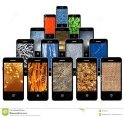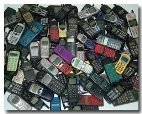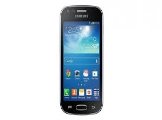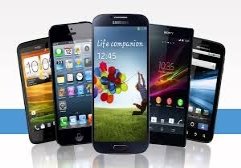Розробка уроку на тему "Mobile phones"
LESSON №2
Level – Intermediate.
Topic: Mobile phone - the most popular gadget.
Objectives:
1. To expand pupils’ vocabulary on the topic; to enrich students’ knowledge of mobile usage; to practice students’ skimming and scanning while reading; to involve students into pair and group working.
2. To develop students’ skills in reading, listening, writing and speaking.
3. To encourage students to express their opinion on the topic; enhance the socio-cultural competence of students when exploring the information about mobile phones; to broaden students’ outlook on the topic.
4. To educate the desire for being informed.
Equipment: a laptop, a blackboard, handout materials.
PROCEDURE OF THE LESSON
I. Introduction
1. Greeting.
Good afternoon children. I’m glad to see you. How are you today? Are you glad to be at school today?
2. Warm up.
Look at the pictures on the blackboard. What can you see?






Can you guess what the topic of our lesson is?
3. Aim.
Well, today we’ll speak about mobile phones and their influence into our life. We’ll learn new vocabulary of the topic and practice in using it. We’ll read and watch information on the topic for identifying the main aims of using mobiles. By the end of the lesson you’ll be able to participate in common conversational exchange on the topic using the information you get and identify pros and cons of using mobile phones.
II. The basic part of the lesson.
1. The introduction of new vocabulary.
Match words with their meaning.
|
Word |
Meaning |
|
|
|
|
|
|
|
|
|
|
|
|
|
|
|
|
|
|
|
|
|
|
|
|
|
|
|
|
Put the new words into the sentences. Change the form of the word if it’s needed.
- __________ is an electronic device used for playing computer games on a television screen.
- You use __________ to say that someone or something is capable of developing into the particular kind of person or thing.
- He used an electronic __________ to measure the rooms.
- No one has come up with a __________ answer as to why this should be so.
- If I finally decide he can come, you take this Newman on a _________ tour round the city.
- They have no way to dispose of the ___________ waste they produce.
- The case _______________ that some women are now trying to fight back.
- In a __________ argument, each step or point must be true if the step before it is true.
- The firm has identified 60 ___________ customers.
- Large amounts of radiation can cause illness and death.... the effects of __________.
2. Watching.
Pre-watching.
- What is the place of mobile phones in our life?
- Why do people use mobile phones?
- What do people use mobile phones for?
While-watching.
Find out if the sentences are true or false.
1. My cell phone was nearly 200$.
2. And I don’t connected to the wireless Internet sometimes.
3. It’s a good idea to access the Internet on your phone.
4. Both of boys are addicted to their cell phones.
5. The lack of use cell phones has become a huge problem.
After-watching.
- What are the best ways to prevent cell phone addiction?
- What are the tips for the proper use of cell phones?
Complete the sentences where necessary.
1. What if my mum takes____________.
2. Sending text messages___________, MP3 files and ringtones and __________.
3. Why are you_______________nervous.
4. Well, wasn’t that kind of _______________________.
5. Both of you are ___________ to your cell phone.
6. I feel uncomfortable when I’m not _____________________ cell phone.
7. It is more convenient to send an message than to_________________.
3. Reading.
Pre-reading.
- Is it hazardous for us to use mobile phones? Why?
- What are the mobile phones useful for?
- Does mobile phones help to develop industry? Why?
While-reading.
Match the paragraphs with the headings A-C.
Is talking on a mobile phone hazardous to your health? It is difficult to know for sure. Some research suggests that heavy users of mobile phones are at a greater risk of developing brain tumours. However, many other studies suggest there are no links between cancer and mobile phone use.
The main problem with the current research is that mobile phones have only been popular since the 1990s. As a result, it is impossible to study the long term exposure of mobile phone use. This concerns many health professionals who point out that many cancers take at least ten years to develop. Another concern about these studies is that many have been funded by those who benefit financially from the mobile phone industry.
__________________________________________
Over three billion people use mobile phones on a daily basis, and many talk for more than an hour a day. Mobile phone antennas are similar to microwave ovens. While both rely on electromagnetic radiation, the radio waves in mobile phones are lower in radio frequency (RF). Microwave ovens have enough RF to cook food and are therefore known to be dangerous to human tissues. However, the concern is that the lower frequency radio waves that mobile phones rely on may also be dangerous. It seems logical that holding a heat source near your brain for a long period of time is a potential health hazard.
____________________________________________
Some researchers believe that other types of wireless technology may also be dangerous to human health, including laptops, cordless phones, and gaming consoles. Organizations that are concerned about the effects of Electromagnetic Radiation (EMR) suggest replacing all cordless devices with wired ones. They say that many cordless phones emit dangerous levels of EMR even when they are not in use. They even suggest keeping electronic devices, such as computers and alarm clocks out of bedrooms, or at least six feet from your pillow.
_____________________________________________
A growing number of health professionals worldwide are recommending that mobile phone users err on the side of caution until more definitive studies can be conducted. They recommend that adults use head sets or speaker phones and that children and teens, whose brain tissue are still developing, use mobile phones only for emergencies. Concerned medical experts use the example of tobacco to illustrate the potential risks. Many years ago, people smoked freely and were not concerned about the effects of cigarettes on their health. Today, people know that cigarettes cause lung cancer, though it is still unknown exactly how or why. Some doctors fear that the same thing will happen with devices such as mobile phones
A. Mobile phones get hot when they are used for a long period of time.
B. Many cancers take ten years to develop.
C. Other wireless technology may also be hazardous to our health.
After-reading.
 Match the sentences with their endings.
Match the sentences with their endings.
1. Some research suggests that heavy users of mobile phones are at a greater risk of…
2. This concerns many health professionals who point out that many cancers take at least ten years…
3. Mobile phone antennas are similar to…
4. It seems logical that holding a heat source near your brain for a long period of time is…
5. Organizations that are concerned about the effects of Electromagnetic Radiation (EMR) suggest replacing all cordless...
6. Concerned medical experts use the example of tobacco to illustrate…
4. Work in groups.
- Read the information about mobile phones. Discuss it. Represent the information you have read and tell your opinion in it.
- The other groups must prepare one question for the group-representor.
5. Work in pairs.
Filling the table, compare the advantages and the disadvantages of using mobile phones.
The usage of mobile phones.
|
Pros |
Cons |
|
|
|
|
|
|
|
|
|
|
|
|
|
|
|
|
|
|
|
|
|
1. Summarizing.
- Well, what have we spoken about today?
- What is the role of mobile phones in our life?
- Is it important and necessary for us to use mobile phones? Why?
- Was the learnt information useful for you? Why?
2. Estimating.
3. Homework.
Prepare dialogues and speak about the advantages and the disadvantages of using mobile phones.


про публікацію авторської розробки
Додати розробку
